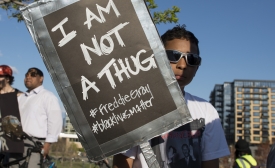public diplomacy
The recent unrest in Baltimore has impacts far beyond the United States. Reputation matters, and events like those that transpired in Baltimore are a proverbial black eye on the U.S.’s image. More specifically, the impact is on public diplomacy.

The perceptions of human rights in the U.S. and abroad.
In recent years an important direction of state policy is support for Russian culture and language in the Russian world abroad. The Public Chamber and the Russian Peace Foundation are implementing ‘The Russian Corner’ project.
When the British Museum lent one of the sculptures known as the Elgin marbles to the State Hermitage Museum here last year, the move angered Greece, which wants the sculptures back, and set off a spirited debate about restitution. But it was also a diplomatic coup by one man: Mikhail Piotrovsky, director of the Hermitage and a skilled cultural ambassador.
The Sudanese Council for International People's Friendship (CIPF), Monday evening organised a celebration at the Oil Club to honour the visit of the Ethiopian public diplomacy delegation. The delegation is currently in the country led by the speaker of the Ethiopian parliament, Abadula Gemeda.The chairman of the agriculture committee of the national assembly, Habeb Makhatoum, the representative of the assembly's speaker, Dr. Al-Fatih Izz Eddin Mannsour, asserted during his address to the celebration the eternal and historical relations between the two countries.
Speaking with Xi, Nazarbayev noted that friendly relations with Kazakhstan’s eastern neighbour was a “priority” for Astana. “We have a plan, and we have outlined specific actions that will take Kazakh-Chinese relations to a new level,” he said.
Two weeks after recalling the ambassador from Jakarta in protest at the executions of two Australian drug traffickers, the government announced Tuesday it plans to cut Indonesian aid by 40 percent from 543 million Australian dollars ($428 million) to AU$323 million. Australia wants to cut its aid budget to AU$4.1 billion next year.
Planning a trip to Cuba? These days, Americans who want to visit the island can book a room on Airbnb.com, the home-stay website, and browse flights on CheapAir.com. These are options unimaginable six months ago, and they reflect the growing range of travel choices borne of the détente between the two countries.







